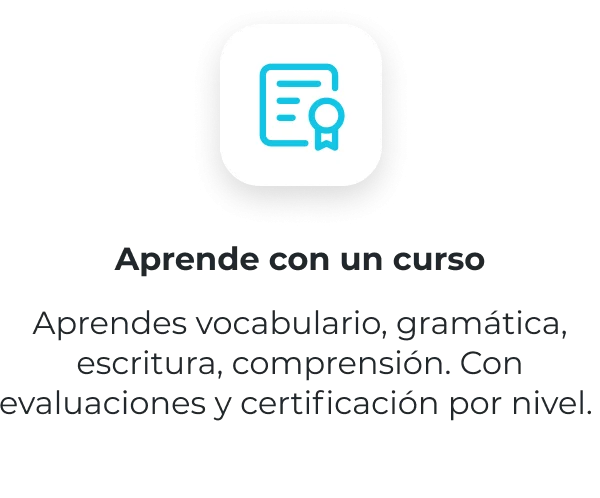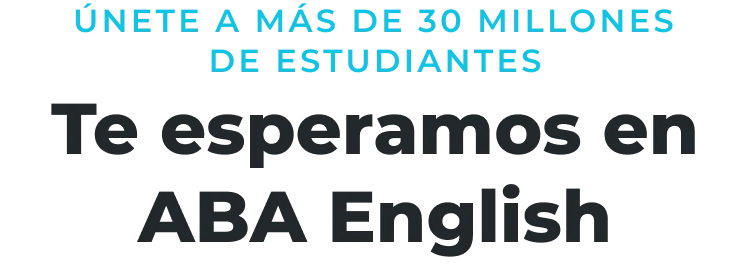Present continuous
Aprende a utilizar el presente progresivo, o continuo, y perfecciona tu nivel de inglés. Regístrate gratis en ABA English y disfruta cada día de una nueva video clase de gramática gratuita
Te presentamos la gramática básica del presente continuo junto con ejemplos y ejercicios para oraciones afirmativas, negativas e interrogativas.
¿Qué es y cuándo usar el presente progresivo?
El presente continuo es uno de los cuatro tiempos verbales del presente en inglés y se usa para describir acciones que están sucediendo mientras hablamos. Al igual que en español, se forma con el presente del verbo to be y el gerundio del verbo correspondiente.
Estructura del present continuous
Forma afirmativa
La estructura de este tiempo verbal en afirmativo es la siguiente:
Subject + to be + verb (-ing)
Ejemplos:
- I am writing. (Estoy escribiendo).
- We are dancing (Estamos bailando).
Forma negativa
Para formar la negación, basta con poner la palabra not después del verbo to be y antes del gerundio. La estructura sería:
Subject + to be + not + verb (-ing)
Ejemplos:
- I am not writing. (Estoy escribiendo).
- We are not dancing (Estamos bailando).
Fíjate que el orden es diferente que en español.
| Estructura | Abreviación |
| I am not | I’m not |
| He Is not She Is no It Is not | He’s not / He isn’t She’s not / She isn’t It’s not / It isn’t |
| You are not We are not They are not | You’re not / You aren’t We’re not / We aren’t They’re not / They aren’t |
Forma interrogativa
Se forma la interrogativa con el verbo to be, el pronombre y el verbo acabado en -ing. La estructura sería:
To be + subject noy + verb (-ing)?
Ejemplos:
- Are you reading? (¿Estás leyendo?) .
- Are we paying attention? (Estamos prestando atención).
| Estructura | Oraciones |
| Am I + verbo con -ing ? | Am I working on Saturday? Am I working hard enough? |
| Is + (He / She / It) + verbo con -ing ? | Is Maria having fun at the party? Is he reading the book I told him? |
| Are + (You / We / They) + verb -ing? | Are they playing soccer? Are you baking a cake for tonight? |
Forma contraída
En el presente progresivo se suele contraer el verbo to be, por lo que puedes utilizar las formas I’m, you’re, he’s, she’s, we’re, you’re y they’re. Aquí nuestra información sobre las contracciones del verbo to be.
+30 MILLONES DE ESTUDIANTES
Únete a la academia digital de inglés
más grande del mundo y aprende inglés
Ejemplos del present continuous
Oraciones en afirmativa
- I am starving. (Estoy hambriento)
- He is not doing anything. (Él no está haciendo nada)
- My mum is cooking rice. (Mi madre está cocinando arroz)
- They are sitting in the sofa. (Están sentados en el sofá)
- You are playing tennis. (Estás jugando al tenis)
Oraciones en negativa
- They are not taking german classes anymore. (No están tomando clases de alemán ya.)
- We are not selling t-shirts anymore. (No estamos vendiendo camisetas ya.)
- Maria and Carlos are not studying enough for their final exams. (Maria y Carlos no están estudiando suficiente para sus exámenes finales.)
- She’s not visiting her friends this summer. (No está visitando a su amiga este verano.)
- My children are not playing in that park, it’s not safe. (Mis hijos no están jugando en ese parque, no es seguro.)
Oraciones en interrogativa
- Are you having a hard time with this test? (¿Te está costando este examen?).
- Is Jane moving out tomorrow? (¿Se va a mudar mañana Jane?).
- Are you learning japanese? (¿Estás aprendiendo japonés?).
- Are we watching a horror movie? (¿Estamos mirando una película de terror?)
- Are they sleeping at Ginny’s house? (¿Están ellos durmiendo en casa de Ginny?)
¿Conoces tu nivel
de inglés?
Haz un test ahora.
Regístrate en nuestra página y accede gratis al test de nivel. En pocos minutos conocerás tu nivel y podrás seguir avanzando con el curso.

Ejercicios del presente continuo
Ejercicio present continuous en afirmativa
A/ Rellena los huecos con el verbo entre paréntesis en presente progresivo afirmativo
- Estoy trabajando. I ______________? (work).
- Él le está diciendo algo a ella: He ___________ her something. (tell).
- Mi hermana está cocinando comida para mí: My sister ____________ a meal for me. (cook).
- Estás bajando las escaleras: You ______________ the stairs. (come down).
- Los Smith están siendo robados: The Smiths ___________ robbed. (be).
- Estamos limpiando la casa: We _________ the house (clean).
Respuestas: am working, is telling, is cooking, are coming down, are being, are cleaning.
Ejercicio presente continuo en negativo
A/ Rellena los huecos en blanco con el verbo entre paréntesis en present continuous negative
- ¿No estás escuchándome?: ___ you ________ to me? (listen).
- Ella no está mirando la TV en su habitación: She _______________ the TV in her room. (watch).
- Ellos no te están esperando: They ______________ for you. (wait).
- Los niños no están jugando a deportes ahora: Kids ___________ sports now. (play).
- Mi hermana no está cocinando ninguna comida para mí: My sister ____________ any meal for me. (cook).
Respuestas: Are you not listening, is not watching, are not waiting, are not playing, is not cooking
B/ Ordena las siguientes palabras para formar frases con el present continuous negative.
- isn’t / the cat / meowing. _______________.
- studying / geography test / they are not / for the. _______________.
- not asking / we are / for you. _______________.
- pancakes / I’m / for breakfast / not eating. _______________.
- not forming / they are / a new music group. _______________.
- sleepy / isn’t / today / she. _______________.
- eating / we / food / not / fast / are _______________.
Respuestas:
- The cat isn’t meowing.
- They are not studying for the geography test.
- We are not asking for you.
- I’m not eating pancakes for breakfast.
- They are not forming a new music group.
- She isn’t sleepy today.
- We are not eating fast food.
Ejercicios presente progresivo en interrogativa
A/ Completa las siguientes frases con el sujeto y verbo que tienes entre paréntesis:
- ¿Sarah está haciendo amigos en la nueva escuela?: ________ friends at the new school? (Sarah / make).
- ¿Estás cocinando la cena?: Are you ______ dinner? (cook).
- ¿Están Mary y John yendo a la escuela?: __________ to school? (Mary & John / go).
- ¿Están tomando clases de karate?: _________ karate lessons? (they / take).
- ¿Está ella leyendo una novela interesante?: __________ a nice novel? (she / read).
Respuestas: making, cooking, going, taking, reading
B/ Ordena las siguientes palabras para formar preguntas con el present continuous interrogative.
- The boy / football / playing / is / ? _________________________
- Waiting / are / for her / Maria’s parents / ?_________________________
- I told you / watching / he / TV show / I / ? _________________________
- Holidays / are / going on / they / ? __________________________
- Family / with him / staying / is / his / ? __________________________
- They / what / are / doing / ? __________________________
Respuestas: Is the boy playing football?, Are Maria’s parents waiting for her?, Is he watching that TV show I told you?, Are they going on holidays?, Is his family staying with him?, What are they doing?
Traducciones: ¿Está el chico jugando a fútbol?, ¿Están los padres de María esperándola?, ¿Está él mirando aquel programa de televisión que te dije?, ¿Ellos se están yendo de vacaciones?, ¿Qué es lo que están haciendo?
Otros enlaces de tu interés:


























